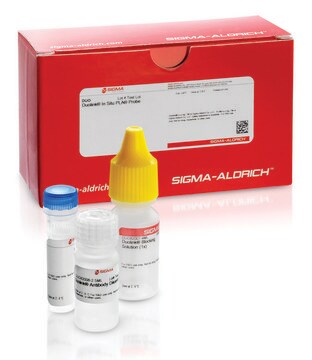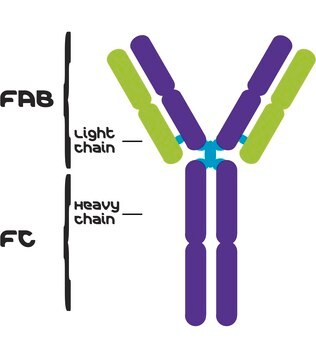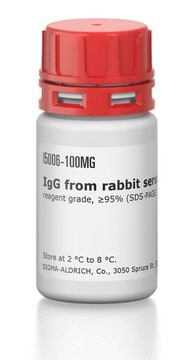DUO87007
Duolink® PLA® Probe Human IgG Isotype Control PLUS human
suitable for proximity ligation assay
Se connecterpour consulter vos tarifs contractuels et ceux de votre entreprise/organisme
About This Item
Code UNSPSC :
41116158
Nomenclature NACRES :
NA.41
Produits recommandés
Source biologique
human serum (polyclonal)
Niveau de qualité
Forme d'anticorps
affinity purified immunoglobulin (Isotype control antibody)
Gamme de produits
Duolink®
Technique(s)
proximity ligation assay: suitable
Adéquation
suitable for brightfield
suitable for fluorescence
Conditions d'expédition
wet ice
Température de stockage
2-8°C
Description générale
An immunoglobulin G (IgG) isotype control antibody with the Duolink® PLA® PLUS oligonucleotide specific for human IgG. This is a convenience product to be used in place of a human primary antibody to determine non-specific background signal and optimal antibody dilution. The anti-human PLA® probe PLUS is not necessary when using this product, but must be used in combination with a MINUS PLA® probe.
Application
Duolink® proximity ligation assay(PLA®) allows for endogenous detection of protein interactions, post translational modifications, and protein expression levels at the single molecule level in fixed cells and tissue samples.
This product can be applied to both the Duolink® In Situ Fluorescence Protocol and the Duolink® In Situ Brightfield Protocol depending on the detection reagents used.
Visit our Duolink® PLA Resource Center for information on how to run a Duolink® experiment, applications, troubleshooting, and more.
This product can be applied to both the Duolink® In Situ Fluorescence Protocol and the Duolink® In Situ Brightfield Protocol depending on the detection reagents used.
Visit our Duolink® PLA Resource Center for information on how to run a Duolink® experiment, applications, troubleshooting, and more.
Application Note
To perform a complete Duolink® PLA in situ experiment you will need two primary antibodies (PLA, IHC, ICC or IF validated) that recognize two target epitopes. Other necessary reagents include a pair of PLA probes from different species (one PLUS and one MINUS), detection reagents, wash buffers, and mounting medium. Note that the primary antibodies must come from the same species as the Duolink® PLA probes. Analysis is carried out using standard immunofluorescence assay equipment.HRP is also available for brightfield detection.
Isotype control PLA probes are used in lieu of a primary antibody in a Duolink® PLA in situ experiment to determine background signal contributed by non-specific binding of the primary antibody. Isotype control PLA probes can also be used to determine the optimal titer conditions of primary antibody PLA probes.
A MINUS probe of a different species must be used simultaneously with this product. See our Product Selection Guide for more information.
Let us do the work for you, learn more about our Custom Service Program to accelerate your Duolink® projects
View full Duolink® product list
To perform a complete Duolink® PLA in situ experiment you will need two primary antibodies (PLA, IHC, ICC or IF validated) that recognize two target epitopes. Other necessary reagents include a pair of PLA probes from different species (one PLUS and one MINUS), detection reagents, wash buffers, and mounting medium. Note that the primary antibodies must come from the same species as the Duolink® PLA probes. Analysis is carried out using standard immunofluorescence assay equipment.HRP is also available for brightfield detection.
Isotype control PLA probes are used in lieu of a primary antibody in a Duolink® PLA in situ experiment to determine background signal contributed by non-specific binding of the primary antibody. Isotype control PLA probes can also be used to determine the optimal titer conditions of primary antibody PLA probes.
A MINUS probe of a different species must be used simultaneously with this product. See our Product Selection Guide for more information.
Let us do the work for you, learn more about our Custom Service Program to accelerate your Duolink® projects
View full Duolink® product list
Caractéristiques et avantages
- No overexpression or genetic manipulation required
- High specificity (fewer false positives)
- Single molecule sensitivity due to rolling circle amplification
- Relative quantification possible
- No special equipment needed
- Quicker and simpler than FRET
- Increased accuracy compared to co-IP
- Publication-ready results
Informations légales
Duolink is a registered trademark of Merck KGaA, Darmstadt, Germany
PLA is a registered trademark of Merck KGaA, Darmstadt, Germany
Code de la classe de stockage
12 - Non Combustible Liquids
Classe de danger pour l'eau (WGK)
WGK 2
Certificats d'analyse (COA)
Recherchez un Certificats d'analyse (COA) en saisissant le numéro de lot du produit. Les numéros de lot figurent sur l'étiquette du produit après les mots "Lot" ou "Batch".
Déjà en possession de ce produit ?
Retrouvez la documentation relative aux produits que vous avez récemment achetés dans la Bibliothèque de documents.
Notre équipe de scientifiques dispose d'une expérience dans tous les secteurs de la recherche, notamment en sciences de la vie, science des matériaux, synthèse chimique, chromatographie, analyse et dans de nombreux autres domaines..
Contacter notre Service technique






